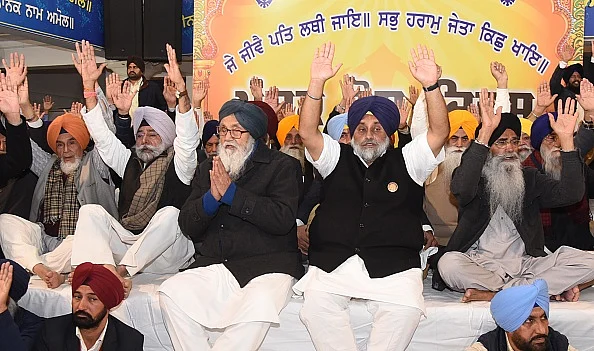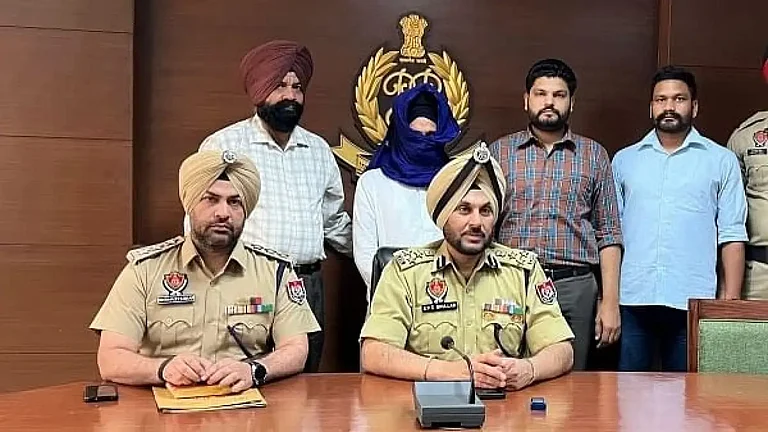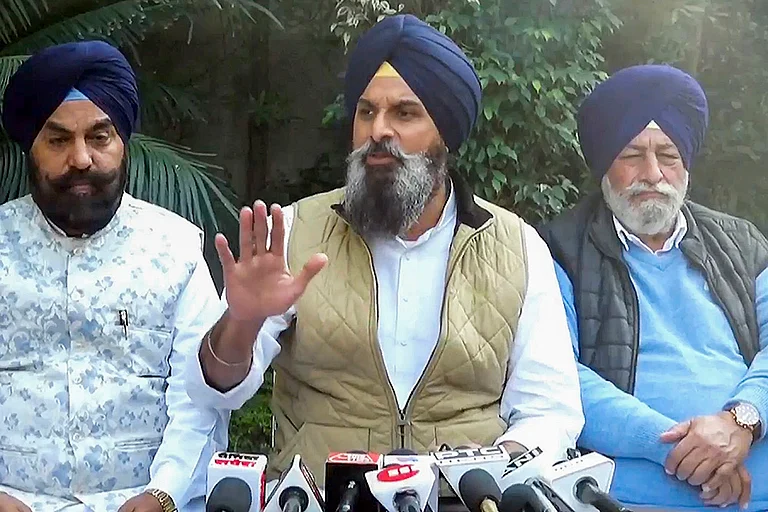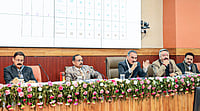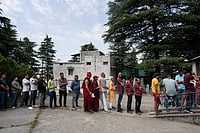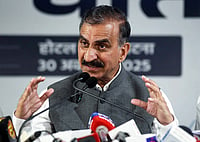Five months after rebellion surfaced in the Shiromani Akali Dal (SAD) against his leadership following repeated electoral defeats, former Punjab Deputy Chief Minister Sukhbir Singh Badal is facing a new challenge—this time from the Akal Takht, the highest religious authority in Sikhism, declaring him "tankhaiya" (guilty of religious misconduct).
It has been almost two months now, and Akal Takhat has yet to pronounce the quantum of punishment he shall undergo. Badal last week chose to step down from the party chief’s post “to pave the way for the party to elect a new president, his replacement.”
But the party’s working committee, which met on Tuesday, refusing to accept his resignation shows that Punjab’s grand old regional party has no choice but to fall back on Badals—whose nearly four-decades-long political dominance and 10-year rule between 2007 and 2017 in Punjab have both substance and controversies.
Though internal pressures on him to resign after the 2024 Lok Sabha polls forced Badal to appoint senior Akali leader Balwinder Singh Bhunder as the party’s working president in August this year, the timing of the appointment was crucial–a day before the Akal Takht announced its decision to hold him guilty for having deeply harmed the image of the 'Panth' and caused damage to Sikh interests.
Soon after the verdict, Badal went on record saying he bowed his head and accepted the order of the Akal Takht.
On Saturday, SAD spokesperson Daljeet Singh Cheema took to the X platform to inform that SAD president Sukhbir Singh Badal has submitted his resignation to the working committee to “pave the way for the election of the new president.” The party’s presidential elections, as scheduled, are expected to be held next month, as per SAD’s five-year electoral cycle.
Many believe Badal’s resignation move may have come due to strong pressures from the Akal Takhat—a trigger to ensure that the party sticks to its core ideological agenda and Sikh–centric politics. However, Sukhbir Singh Badal, party president since 2008 and later Deputy Chief Minister, should bear the brunt of the drift, and several incidents clearly hurt Sikh sentiments.
Those being frequently quoted include the failure of the SAD government to punish those responsible for the 2015 sacrilege incidents and pardoning Dera Sacha Sauda chief Gurmeet Ram Rahim Singh, the controversial blasphemy case of 2007.
Nevertheless, the resignation has come when Akali Dal, after having snapped its two-decade-long tie-up with the BJP in 2020 protesting against controversial farm laws, was finding itself at a crossroads. Its core electoral support in Punjab had rapidly shrunk, and the party fared poorly in the 2017 state assembly election. After that, it hopelessly suffered debacles in the 2022 assembly polls and could win just one seat in the 2024 Lok Sabha elections.
In the Lok Sabha elections, the party’s vote share dropped from 27.5 per cent in 2019 to 13.4 per cent. Sukhbir Singh Badal did not contest the poll, while his wife, Harsimrat Kaur, won the Bathinda seat.
The defeat later led to strong rebellion in the party. Among the dissidents were senior leaders Gurpartap Singh Wadala, Bibi Jagir Kaur, Prem Singh Chandumajra, and Parminder Singh Dhindsa. The party quickly expelled some of the rebels to quell the dissidence, but soon, they formed a pressure group named ‘the Akali Dal Sudhar Lehar’.
As per Prof Ashutosh Sharma, a professor of political science at Panjab University, Chandigarh, “ Badal’s leadership has been in crisis for a long time due to the dismal performance of the Akali Dal in the series of polls held in Punjab. Now, Akal Takhat has also held him guilty of hurting the Sikh sentiments following the incidence of sacrilege and subsequent firing in 2015. Also, Badal, as a businessman, has had an image problem.”
Yet, Prof Sharma also believes that Badal will have to work on a collective framework as any next poll debacle for the Akalis under him could turn him into a political liability in his own party.
Despite this, the political observers in Punjab claim that Badal may continue to call his shorts. At the same time, Akali Dal’s relevance in Punjab politics can’t be oversighted in the wake of the emergence of the Sikh radicals, getting electoral space vacated by the Akali Dal. Punjab BJP chief Sunil Jakhar went on record during one of his interviews, saying that weakening the Akali Dal would not be in the larger interest of Punjab.
“A strong regional party is and will remain a necessity for Punjab. Despite any political differences, I have always advocated for preserving this Panthic party in the interest of Punjab,” he said and appealed to the Akal Takht to safeguard the Shiromani Akali Dal (SAD), the second oldest political party in the country.”
He also called for a “balance between reprimanding individuals and safeguarding the Panthic party’s future.”
Many in Punjab recall that rebellion and factionalism in the Akali Dal are not new phenomena. The party, even under Prakash Singh Badal,has seen ups and downs since 1991, when Badal broke from Simranjit Singh Mann,a former MP, accusing him of ideological drift and polarising Sikh politics.
Many term this period as the resurgence of Badal. He remained party president between 1995 and 2008 when Sukhbir Singh Badal, who also had served as minister in the NDA under Atal Bihari Vajpayee, succeeded him. Under Badal Jr.—whose term as SAD president also witnessed Akali Dal’s growth as an alliance partner of BJP, but its party’s fortunes declined sharply after the 2017 poll defeat to the Congress in Punjab with Capt Amarinder Singh becoming Chief Minister.
In 2022, the Aam Aadmi Party (AAP) registered its biggest victory, which caused stalwarts in the Akali Dal and Congress to lose their seats—the worst kind of defeat two big parties suffered due to public anger against their leaders.
“The coming months are going to be crucial for the Akali Dal as it faces internal dissent particularly against Badal and also Akal Takhat verdict,” says a senior journalist at Chandigarh.
Many in Punjab also see it as an opportunity to infuse new blood into the party to steer it at a time when disillusionment with the AAP government is growing on one hand, and radicals are capturing the political space. Others claim that the party's future, however, seems uncertain without the Badals at the helm, as the roots of dynastic politics run deep. No other potential Akali face has yet had a strong base in all regions—Majha, Malwa and Doaba.
The next few days are going to be significant for Akali Dal—when the focus shifts to Punjab.






